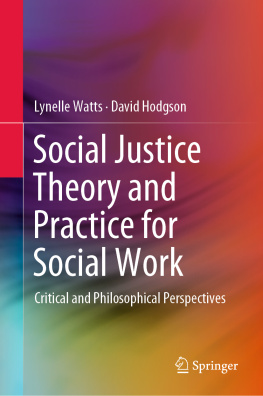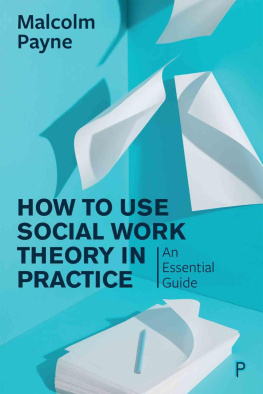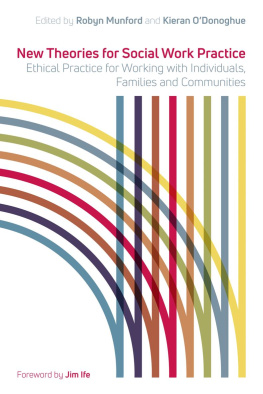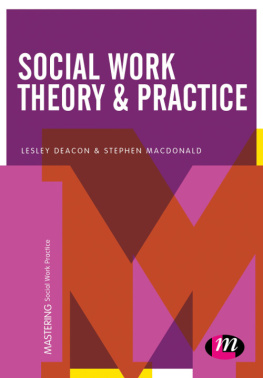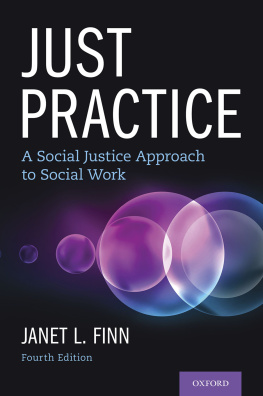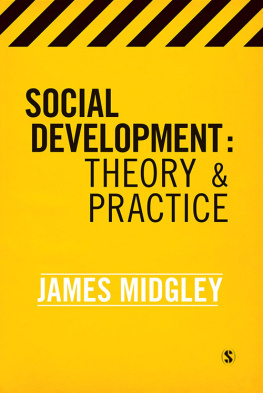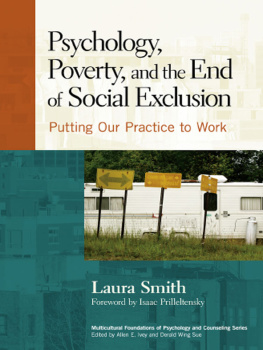Lynelle Watts - Social Justice Theory and Practice for Social Work
Here you can read online Lynelle Watts - Social Justice Theory and Practice for Social Work full text of the book (entire story) in english for free. Download pdf and epub, get meaning, cover and reviews about this ebook. year: 0, publisher: Springer Singapore, genre: Politics. Description of the work, (preface) as well as reviews are available. Best literature library LitArk.com created for fans of good reading and offers a wide selection of genres:
Romance novel
Science fiction
Adventure
Detective
Science
History
Home and family
Prose
Art
Politics
Computer
Non-fiction
Religion
Business
Children
Humor
Choose a favorite category and find really read worthwhile books. Enjoy immersion in the world of imagination, feel the emotions of the characters or learn something new for yourself, make an fascinating discovery.
- Book:Social Justice Theory and Practice for Social Work
- Author:
- Publisher:Springer Singapore
- Genre:
- Year:0
- Rating:4 / 5
- Favourites:Add to favourites
- Your mark:
- 80
- 1
- 2
- 3
- 4
- 5
Social Justice Theory and Practice for Social Work: summary, description and annotation
We offer to read an annotation, description, summary or preface (depends on what the author of the book "Social Justice Theory and Practice for Social Work" wrote himself). If you haven't found the necessary information about the book — write in the comments, we will try to find it.
Social Justice Theory and Practice for Social Work — read online for free the complete book (whole text) full work
Below is the text of the book, divided by pages. System saving the place of the last page read, allows you to conveniently read the book "Social Justice Theory and Practice for Social Work" online for free, without having to search again every time where you left off. Put a bookmark, and you can go to the page where you finished reading at any time.
Font size:
Interval:
Bookmark:
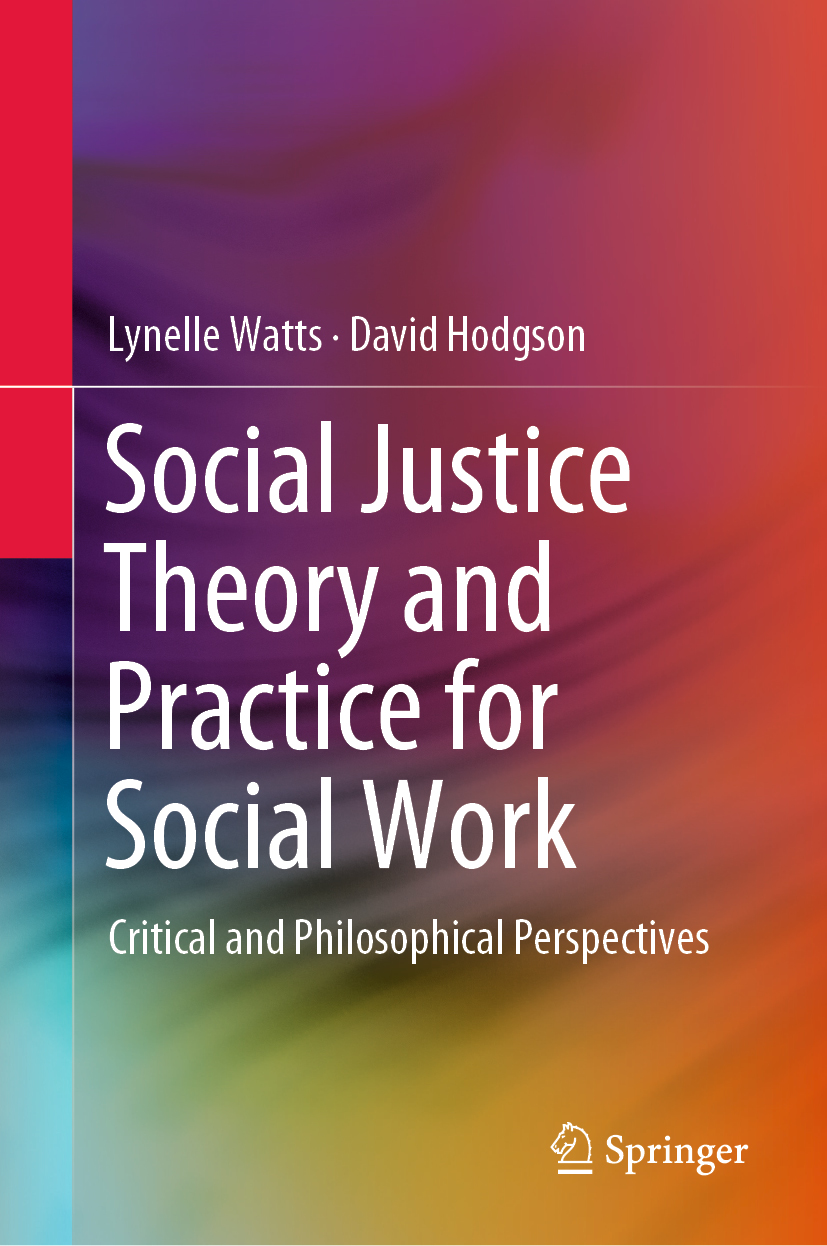

This Springer imprint is published by the registered company Springer Nature Singapore Pte Ltd.
The registered company address is: 152 Beach Road, #21-01/04 Gateway East, Singapore 189721, Singapore
This book is dedicated to people everywhere in their struggles for recognition and the pursuit of social justice.
All monies the authors earn from commission or sale of this book will be donated to the Asylum Seeker Resource Centre in Australia https://www.asrc.org.au/ .
In recent years, social justice has moved to become a central principle and value within social work. As social work educators, we found that many of our conversations with students and our colleagues centred on understanding, explaining and debating different approaches to addressing the many forms of injustice that require attention. We also found this area to be a slippery and difficult terrain to cover with students as it is replete with competing approaches, different conceptions of social justice and different levels of analysis. For example, the view of social justice changes with the level of resolution, depending on whether we are conceptualising justice at the level of individuals or groups and communities. This changes the kinds of questions we can ask about what should be done and why?
To address some of these issues, we turned to the literature to try and bring clarity to our discussions about social justice. We figured that others have experienced similar issues in grappling with the complexity of addressing social justice and engaging students in thinking and acting about it. In doing so, we could see there was an opportunity to initiate a dialogue between social work understandings of social justicebuilt from long engagement with people experiencing poverty, disadvantage, injustice, oppression, stigma and discriminationand the critical and philosophical literature concerned with developing concepts and principles of social justice. We found that the philosophical literature can offer significant clarity in terms of tracing concepts such as freedom, democracy, theories of distribution and justice, and that critical theories offer a corpus of resources to theorise the way social structures perpetuate oppression, discrimination and stigma. We also found that many of these theoretical ideas have been tested and given significant expression in social work practices. Hence, we have used a mix of influential classic literature, as well as more contemporary sources.
This book, therefore, represents something of an interchange between social work literature and a range of critical and philosophical literatures that have considered issues of social justice. We see this as an important critical and practical activity intended to extend the conversation about social justice within social work. Thus, in writing this book, we have taken seriously the notion that critical reflection means testing the limits of the present with a view to transforming the conditions of possibility, and thereby, going beyond them. Doing so means starting where we are, and that means engaging in dialogue about these issues with students and colleagues through writing this book.
Thus, a key aim with the book has been to contribute to the clarity about foundational concepts for illuminating social justice. These will be familiar to our readers: human rights, democracy, dignity, equality and fairness in distribution and outcomeall important values and practices for extending the reach of justice. We have done so in an open-ended fashion recognising the essentially contested nature of many of these values. The book has also offered a description of various problematics that work against these values and practices. Here, we are thinking of economic liberalisation and ongoing imperialisms, forms of structural oppression and discrimination, ramified patterns of poverty and disadvantageall of which have been described and theorised extensively in critical social work literatures.
The book also has some limits. We have not provided a definitive outline of how social justice ought to be thought about, nor do we seek to legislate a single program of action or thought for social work to take. For example, the book is critical to the extent that it interrogates various limits to current theoretical thought but it is not specifying a particular version of critical theory. Rather, we have presented critical theories as important resources that may increase the resolution of specific forms of injustice. For example, Marxism has long been useful for descriptions of alienation but it has limits for helping to illuminate specific issues for peoples experiencing colonisation of land and culture. Other theories may have more explanatory power for this. Our aim has been to demonstrate putting theoretical resources to work .
The goal of the book is twofold. First, the book is aimed at students and educators in social work and provides resources to initiate and support discussions about social justice informed by a range of theoretical ideas drawn from the discipline of social work, the social sciences and areas of political and moral philosophy. Second, the book will support the work of practitioners and provide theoretical resources to consider different areas of practice within social work. We hope that with these goals the book will contribute to extending the conversation about social justice practice in social work.
This book is organised into three main sections. The first part of this book (Chaps. is to give shape to some enduring and emerging problems that social work must grapple with. These problematic factors are writ large as major challenges for the future of social justice, and deconstructing them is central to critically reflective and socially just social work practice.
Font size:
Interval:
Bookmark:
Similar books «Social Justice Theory and Practice for Social Work»
Look at similar books to Social Justice Theory and Practice for Social Work. We have selected literature similar in name and meaning in the hope of providing readers with more options to find new, interesting, not yet read works.
Discussion, reviews of the book Social Justice Theory and Practice for Social Work and just readers' own opinions. Leave your comments, write what you think about the work, its meaning or the main characters. Specify what exactly you liked and what you didn't like, and why you think so.

